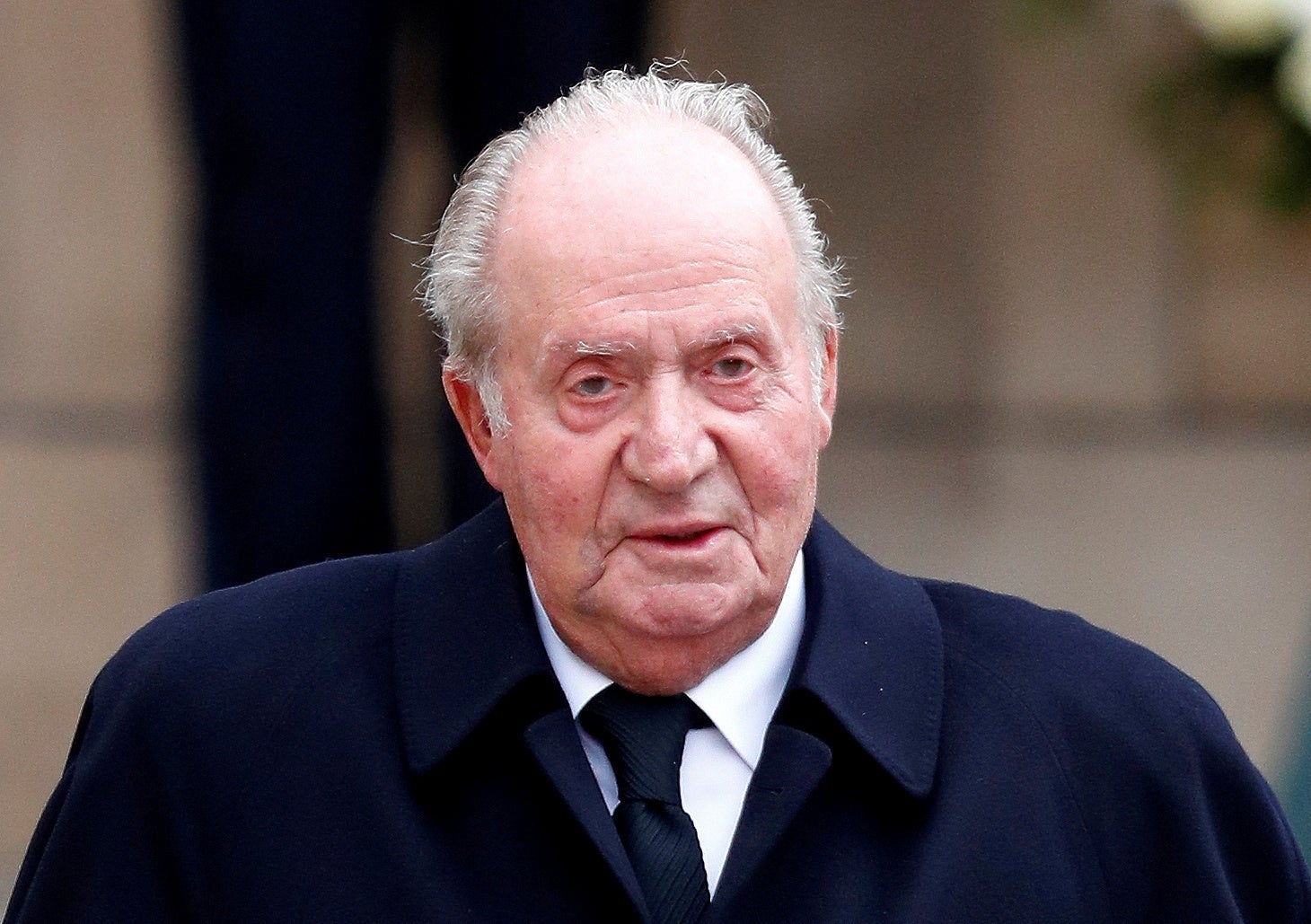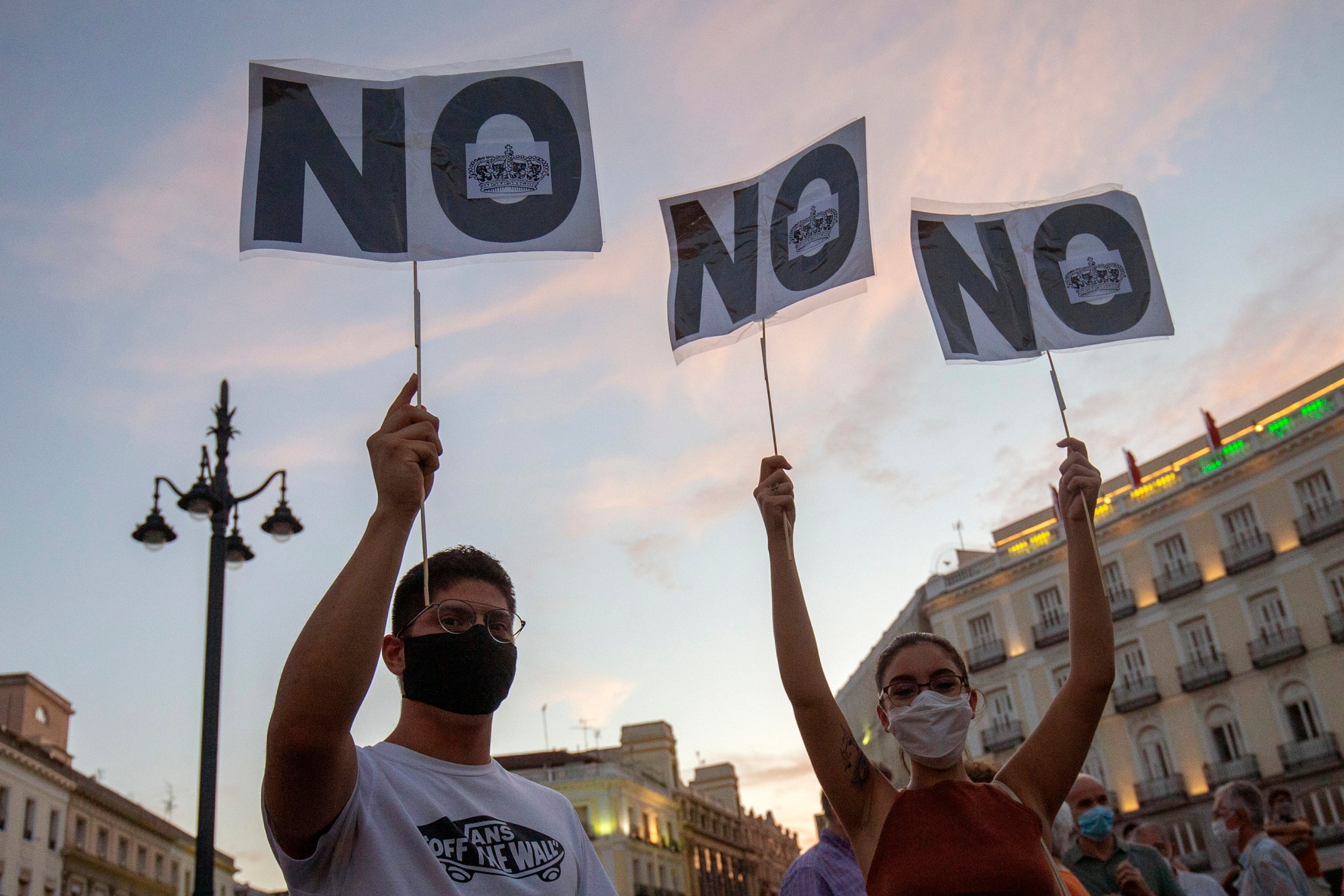Where is Juan Carlos? Hunt for Spain’s former king prompts mix of anger and amusement back home
Juan Carlos has finally turned up in Abu Dhabi - but his scandals and vanishing act are still fuelling republicanism back home, as Graham Keeley reports from Madrid


It was like a blue-blooded Where’s Wally. The worldwide hunt for Spain’s former king Juan Carlos finally ended on Monday when the royal palace revealed he had been staying in the United Arab Emirates since his abrupt departure from Spain.
The news ends two weeks of rumour, speculation and mystery over the ex-monarch’s whereabouts since he disappeared amid a financial scandal involving Saudi Arabia and which has provoked a surge in republican feeling in Spain.
Anger has been directed at the once-respected royal for disappearing while investigations are underway over his financial affairs in Switzerland and Spain.
The 82-year-old made the bombshell announcement that he had decided to leave Spain on 3 August, suggesting that he was already well on his way to – who knew where?
Behind the puzzle of the ex-monarch’s whereabouts was a story of errant kings, blonde ex-mistresses and tens of millions of dollars allegedly hidden away in tax havens. And it was amusing and appalling for his 47 million former subjects back home in Spain in equal measure.
The first really tangible clue to Juan Carlos’ hideaway came a week ago, when the Spanish news website Niusdiario.es published what it said was a photograph of him getting off a plane at Abu Dhabi’s international airport on the same day he was supposed to have departed Spain.
In a blurred shot, the picture appeared to show Juan Carlos wearing a white face mask and talking to an airport worker. There has still been no official confirmation that the photograph was genuine, though it tallies with the timeline provided by the palace today.
Its emergence also backed up a report the day before in the pro-royalist newspaper ABC, which detailed Juan Carlos’ journey from Spain to the United Arab Emirates.
The paper claimed the ex-monarch was flown over 6,000km in a private jet to Abu Dhabi from the northwestern Spanish city of Vigo.
From there he was supposedly flown by helicopter with four bodyguards to the luxurious Emirates Palace Hotel, where he was reported to be staying in the presidential suite at a cost of £10,000 a night.
The UAE government and the hotel itself are yet to comment.
In the absence of official confirmation, other media fuelled the mystery by claiming Juan Carlos was holed up in a luxury resort in the Dominican Republic, where he was said to be the guest of a wealthy Cuban sugar baron.
And yet more outlets insisted Juan Carlos was hiding out in Portugal, where he spent much of his youth. Officials in both countries said they had no knowledge of the arrival of an errant octogenarian royal.

Finally, it was Juan Carlos himself who put an end to the guessing game.
“His Majesty Juan Carlos has indicated to this household to communicate that he travelled to the United Arab Emirates on 3 August and that is where he currently remains,” a spokesperson for the royal household said.
Despite the drama surrounding his Spanish exit, it seems unlikely Juan Carlos will be away for too long – he has told friends, “I will be back in September,” according to El Pais newspaper.
As for why Juan Carlos disappeared, a letter he wrote to his son King Felipe VI was made public after he left in which he said he was going because of the “public repercussions of certain episodes of my private life”.
In June, Spain’s Supreme Court opened a preliminary investigation into Juan Carlos’s involvement in a €6.7bn (£6bn) high-speed rail contract in Saudi Arabia, after Switzerland’s La Tribune de Geneve newspaper reported he had received $100m from the late Saudi king in 2008.
Switzerland has also opened an investigation into the $100m “donation” from the Saudi royal family which the ex-king is alleged to have put into an offshore account in 2008. Four years later, he allegedly gave €65m from the account to Corinna zu Sayn-Wittgenstein, a London businesswoman, with whom the ex-king maintained a relationship between 2005-2009.
The former monarch is not formally under investigation and has repeatedly declined to comment on the allegations.
Javier Sanchez-Junco, Juan Carlos’s lawyer, said last week his client was at the prosecutor’s disposal despite his decision to leave.
Nevertheless, the sudden departure of a man who reigned over Spain for nearly 40 years has prompted a surge in republican sentiment in Spain, from calls to remove the name of Juan Carlos from a university and roads to anti-monarchy protests.
Pedro Sanchez, the Spanish prime minister, has defended the monarchy and insisted the departure of Juan Carlos would allow Felipe to reign without the distraction of the financial scandal involving his father.
But William Chislett, an analyst at the Real Elcano Institute think tank in Madrid who interviewed Juan Carlos in 1977, said his departure had not been handled well.
“Expatriating the king in this way does not look good, nor does the fact he might be staying in a £10,000 per night hotel at a time when most Spaniards are struggling through a crisis because of the pandemic,” he told The Independent.
Juan Carlos is often credited with raising the popularity of the monarchy by ushering in democracy after the death of Spanish dictator General Francisco Franco in 1975.
But on Sunday, a majority of Spaniards – 56.2 per cent – said they felt Juan Carlos’ decision to move abroad was “misguided”, according to a poll of 802 people published in the ABC newspaper, with only 25.4 per cent supporting the king’s decision.
David Jimenez, a writer and former editor of El Mundo newspaper, believes Juan Carlos is now the worst enemy of the monarchy.
“The way the king suddenly left without any explanation just shoots the institution of the monarchy in the foot. This whole affair will make life much more difficult for Felipe,” he said.
Join our commenting forum
Join thought-provoking conversations, follow other Independent readers and see their replies
Comments